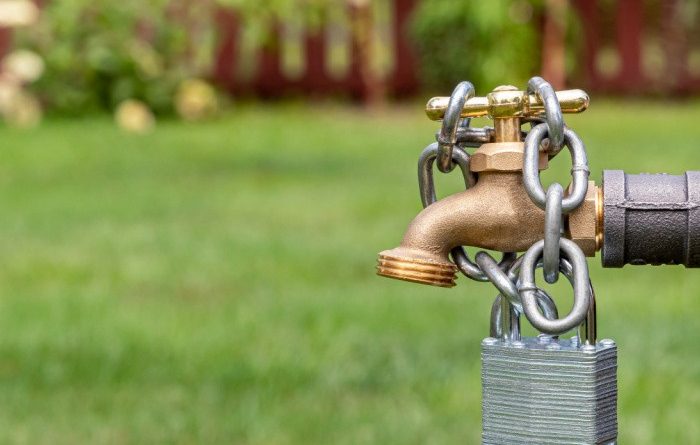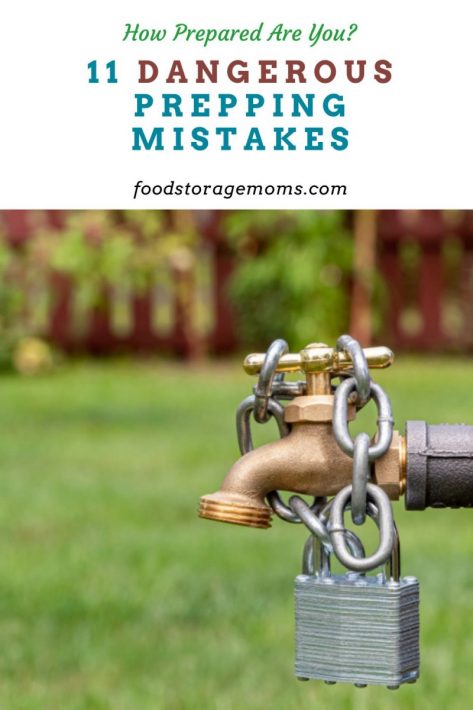By Linda Loosli

Although it seems simple at first, to be properly prepared for you and your family, there are a lot of things that go into it, and thus the chance for some significant mistakes. Let’s review some things that you should consider as you put together or review your prepping plan.

Dangerous Prepping Mistakes
When it comes to a disaster, a mistake is something you simply cannot afford. After all, there are no re-dos or coming back from a game over. These are dangerous prepping mistakes that can prove disastrous for you and your loved ones and ways to avoid them.
Not Gathering Enough Food and Water
When it comes to prepping basics, food and water should be at the top of your list. While people can survive for a handful of days without food, the body can only last for about 2 to 3 days without water. So it’s crucial that you stock up on enough food and water for you and your family in case of an emergency.
However, many people make the mistake of only storing enough food and water for a short period of time. They may think that they can get by with a few days’ worths of supplies, but if a disaster strikes and they’re stuck in their homes for weeks or even months, their supplies will quickly run out.
To avoid this mistake, store enough food and water for at least a few months. And if you can, try to stock up on non-perishable items that have a long shelf life. That way, even if you can’t get to your supplies for a while, you’ll still have something to eat. But don’t overwhelm yourself all at once. Start with a smaller emergency supply and work your way to a larger inventory over time. Water Filtration System
This is the water filtration system I highly recommend, The Best Portable Water Filtration Unit
Sharing Information with the Wrong People
When you’re first starting out with prepping, it can be a lot of fun learning new skills and stocking up on items that you may one day be thankful that you had. But that doesn’t mean that you should share all your plans with just anyone.
Spilling the beans with complete strangers or neighbors that you can’t really trust could put your family and home at risk. Even if your home isn’t broken into prior to a disaster, those same folks may one day come knocking after the disaster strikes. And trust me, it won’t be a friendly visit. Why You Need Emergency Contact Information
Putting All Your Eggs in One Basket
Don’t get caught in a disaster situation hundreds of miles away on some beach somewhere, while your emergency supplies are sitting safely back at home where you left them. They certainly won’t be doing you any good, will they?
That’s why storing all of your emergency supplies in one location is not a great plan because you just never know when or where a disaster might strike and where you’ll be.
That’s why every prepper should have a bug-out bag that’s always ready to go in case they need to evacuate their homes quickly. Another idea to think about is to have one already stowed away in your vehicle so that it’s with you no matter where you are. It will at least tide you over for a few days until you can figure out your next steps.
Focusing on “Bugging Out” Too Much
“Bugging out” just sounds much more macho, doesn’t it? While living off the land by hunting for meat and foraging for food may seem like a dream come true if you consider yourself an avid outdoorsman, it’s much harder than you think.
Not only does it create a lot more challenges for you, but it’s also a lot riskier, especially for those of you with younger children or the elderly in your home.
You’ll also no longer have all the comforts that your home provides you. In most cases, choosing to “bug in” will exponentially increase your family’s chances of staying alive, so don’t plan on running for the hills unless you absolutely have to. Should You Bug In or Bug Out? What to Know
Saying “I’ll Never Bug Out”
On the other end of the spectrum, there are preppers who have taken the stance that they’ll stay put in the comfort of their homes no matter what. But what would you do if your home was severely damaged in a wildfire or utterly destroyed in a flood?
While “bugging in” increases your family’s survival in most cases, it certainly doesn’t in situations like these. This is why you’ll need to have a backup plan where your family can seek shelter following a disaster and be prepared for both scenarios.
I will say this, I hope I never have to bug out. In case you haven’t purchased this book I highly recommend, “Bugging In” by Raymond Dean White
Prepping for the Wrong Disaster
It might sound silly to some of you, but there are plenty of preppers out there who have been planning and prepping for the wrong kinds of disasters. So do your research and find out what disasters are more likely to happen in your area and then plan and prepare accordingly. Disaster Supplies: 11 Items You May Need After A Disaster
Not Taking the Time to Learn the Proper Skills
One of the most important aspects of prepping is learning survival skills.
This includes everything from starting a fire to building a shelter and purifying water.
In a Disaster scenario, these skills will be your lifeline, so it’s important that you take the time to learn them now.
There are other skills you can not only use to protect and provide for your family but also use as bartering chips when you can help others and receive food and materials in return. Maybe you’re an electrician, a plumber, a mechanic, or other skilled tradesmen where your vocational or hobby skills can be shared.
Failing to Maintain Your Preps
Failing to maintain your preps is one of the most common mistakes that preppers make. Water, food, and fuel all have expiration dates, so if you’re not regularly checking and rotating your supplies, they could go bad before you ever need to use them. The same goes for medical supplies, batteries, and anything else that has a shelf life. Bottled water from the grocery store has an expiration date, or at least it used to have best-by dates. I no longer buy bottled water. You can still drink it but after a while, the plastic chemicals may leach into the bottles.
Another thing to keep in mind is that your skills will rust over time as well, so you’ll need to keep them sharp by practicing regularly. This is especially true for things like self-defense and first-aid.
Not Practicing with Your Gear
Let’s say that the power grid goes down and it looks like it might be out for an extended period of time. Would you know how to use that generator that’s been sitting in your garage for the past few years? Do you even remember where you stored it, how to start it, where the proper fuel is, etc.?
This is why it’s so important to get familiar with your gear and practice using it on a regular basis. That way, when challenges come your way, you’ll be able to hit the ground running without having to waste valuable time trying to figure out how everything works.
It would also be wise to include others in your household in that training and practice, on an age-appropriate basis. Doing things together as a family can take a lot of different forms. Be creative and inclusive, it will pay off!
Relying on Technology Too Much
Prepping should be about giving you and your family the best chance to survive in a disaster, and not necessarily about stocking up on items you’ll never use for an Armageddon situation that may never happen in your lifetime.
This is why so many people fail at prepping; they get caught up in all the “cool” gear and gadgets and forget what prepping is really about. While technology can certainly help you in a disaster, it shouldn’t be your only focus. Prepping Things You’re Not Doing That You Should Be
Not Having a Well-rounded Plan
When it comes to prepping, one size does not fit all. What works for one family may not work for another, and this is why it’s so important to have a well-rounded plan.
This means that you need to take into account the specific needs of your family, as well as the types of disasters that are most likely to occur in your area. Come up with a plan as a family and go over what you would do in various disaster scenarios.
One simple example is the types of food you store. I don’t know about you, but as our girls became teenagers they got to be pretty picky eaters. Imagine having a bunch of food stored away and then trying to get your kids to eat foods they don’t like. Have some dialogue, take them with you when shopping, and get input so a miserable situation that you didn’t cause becomes even worse because you didn’t plan with everyone’s needs in mind.
Final Word
These are several dangerous prepping mistakes that people often make. If you’ve been caught doing any of them, take this as a warning. It could one day prove very costly by continuing to ignore these mistakes. Can you think of any other common mistakes that people make while prepping that could prove life-threatening? I’d love to hear from you! May God Bless this world, Linda
Copyright Images: Outdoor Water Faucet With Lock AdobeStock_512222554 by JJ Gouin
No comments:
Post a Comment